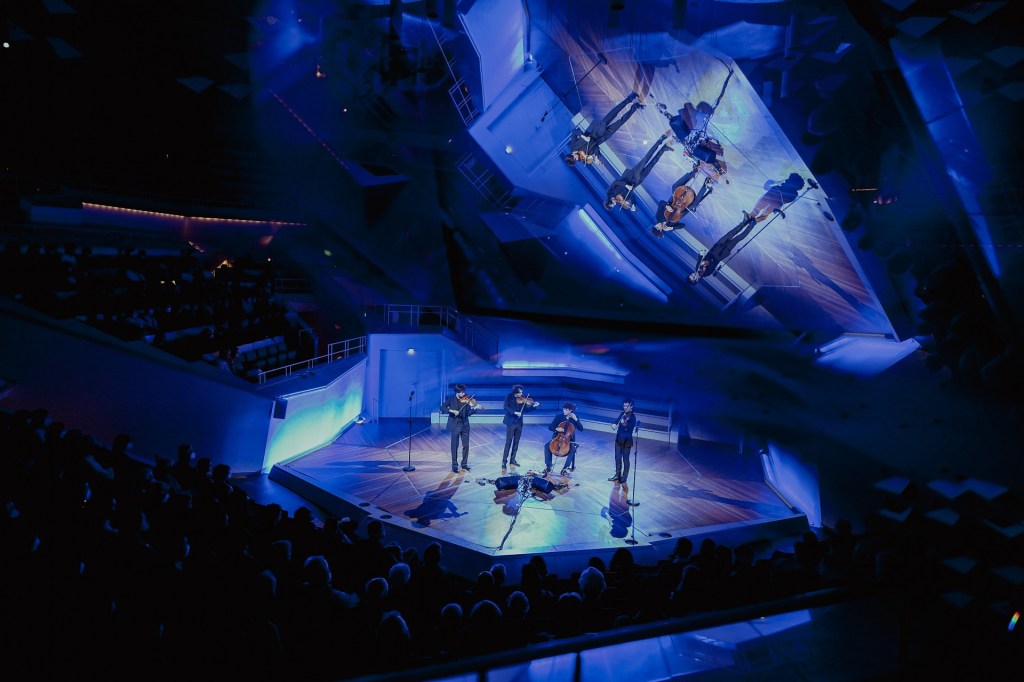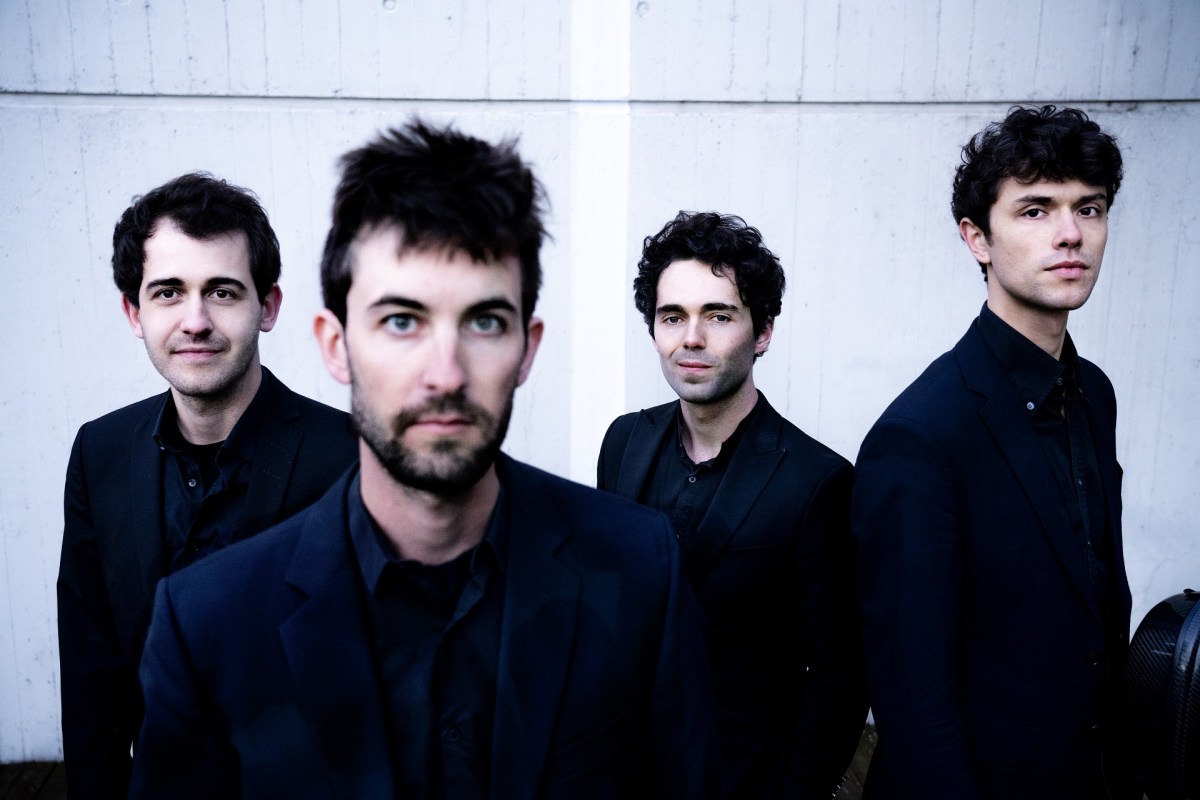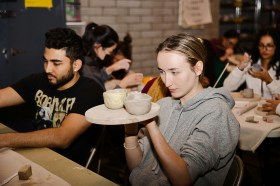Based in Berlin, Vision String Quartet is an exciting group of multi-award-winning musicians making its professional debut in Australia and touring 12 concerts across the country. Under the umbrella of Musica Viva, the presenter of the tour, the group will visit Newcastle, Melbourne, Hobart, Brisbane, Perth, Canberra, Sydney and Adelaide between 21 September and 12 October. Additionally, it will perform as part of Musica Viva’s regional program in Tyalgum, northern NSW and undertake two special presentations of its own music, in partnership with the UKARIA Cultural Centre in Mount Barker, South Australia.
Musica Viva’s Artistic Director, Paul Kildea, is well-known for his talent spotting and for engaging early career musicians and groups, as is the case with Vision String Quartet. He first heard the group at the Wigmore Hall in London and was so impressed by their playing and astonishing delivery that he contacted their management to see if they would like to come to Australia.
He says: ‘The Vision String Quartet is a truly remarkable group. With a mission to readdress how classical music is presented and perceived by audiences and a penchant for experimentation, its national tour promises to be an exhilarating experience.’
Anne Frankenberg, CEO of Musica Viva says: ‘What Paul is aiming for in performances like these, is the extraordinary, the extra element that might add the unexpected, or the extra intensity – something that just astonishes and he feels that this Quartet has the capacity to do just that.’
Regarded as one of the world’s finest young string quartets, with concert tours in Europe, North America, Japan and Asia, the quartet’s members are equally excited to be coming to Australia for the first time. Frankenberg says: ‘It is quite a big deal for them as a relatively young quartet to be taking on such an extensive tour. I know they are really looking forward to it and to the opportunity to be here.’
Repertoire and interests
ArtsHub caught up with the Vision String Quartet between rehearsals in Berlin, where the four are deep into perfecting the repertoire for their Australian tour. Violinist Florian Willeitner is the spokesperson for the group, but ArtsHub also met fellow violinist Daniel Stoll, violist Sander Stuart and cellist Leonard Disselhorst.
They are a remarkably youthful, enthusiastic and clearly dedicated group of musicians who have been widely praised for their astounding musicianship – the German newspaper Der Tagesspiegel describing them as ‘amazingly vivacious, vivid and electrifying’. Moreover, they have distinctive views on the type and style of music that they play.

Willeitner says: ‘We got to know each other at a music festival in southern Germany some 10 years ago. It was a very important festival for us, because it was like a melting pot of creativity, discussing new concert formats, but also performing classical music in different contexts and in different venues.’
Willeitner went his separate way musically after that and only joined the Quartet two years ago. He says: ‘We always kind of followed each other. We’re in the same creative bubble and eventually two years ago we joined forces and it feels great.’
The Quartet has developed an eclectic mix of classical, rock, folk and jazz in its repertoire in recent years. Willeitner says: ‘What drives us as an ensemble is to obtain an element of creativity within the classical chamber music group. We don’t want to only interpret music that is written by other composers, but also to deal with contemporary musical influences and styles.
‘If you take jazz for example – it has a musical style and language, dealing with the present, but also shaping a future sound. We see this also in West African music, heavily influenced by jazz and pop music.’
He continues: ‘We put a lot of work into developing this contemporary type of music for ourselves and working in collaborations with musicians outside of the classic tradition. This kind of music has a completely different DNA than classical music. We are also emphasising this collaborative part of our ensemble at the moment, working with many interesting musicians in different genres, whose work we admire. We compose our own music too and also in our collaborations. Spectrum is our most recent album.
‘We normally add some moving lights or coloured lights when we perform our own music, elements that fit the music and make it more like a pop music concert. We don’t necessarily do that in our classical concerts, but we like to work with great lighting.’
He adds, ‘We have also just had some special outfits made – not too crazy – but it adds a certain element to the concert platform.’
Playing from the heart
What sets this Quartet apart from many others is the preference and ability to play from memory, especially in the classical music repertoire, which is clearly immensely difficult to do. Willeitner calls this ‘playing from the heart’.
Frankenberg notes the Quartet’s uniqueness and says: ‘There are not many string quartets prepared to play from memory, particularly with serious, substantial repertoire. I think the level of concentration, focus and intensity that Vision String Quartet need to achieve this is amazing. The connection between the players can be absolutely electric and magnetic. That sense of incredible connection then comes across to connecting with the audience. It can be quite riveting.’
Willeitner says: ‘It’s not only that we play by heart or we play standing up, I think we have a different approach to classical music. Our playing gives us a lot more freedom, flexibility and spontaneity. When we perform on stage that gives us a certain vibe of freedom, which we enjoy.’
READ: Music review: Among the Birds and the Trees, Conservatorium Theatre, Brisbane
Willeitner mentions the Bartόk String Quartet, which the group will be playing in Australia. He says: ‘We have performed the Bartόk a few times before, but never from memory until now. It has taken a while to get this work really into our head. We worked on our parts individually when we had free time over the summer. Then we came together and so now we can play it by heart and it just adds so much more to the work. The flexibility, the freedom in your head, being able to listen to the others, the ability to be even more spontaneous, especially in the fifth movement of this glorious work. Plus, there is just a special connection to the audience, as there are no barriers.’
Touring program
The program that Vision String Quartet is presenting for the main touring program consists of three classical works that are, in many ways, very close to their hearts: Bloch’s Prélude, B.63; Bartόk’s String Quartet No.4 in C Major and Dvořák’s String Quartet No.13 in G Major, Op.106. Vision String Quartet suggested some works and then Musica Viva, as the presenter, made a choice as to what best suited its audiences and the tour. It was a collaborative process.
Willeitner says that, being from southern Germany, he finds the music of Bartόk and Dvořák very meaningful. ‘Both composers are so heavily influenced by folk music from their regions that these works have a certain resonance for me, while Bloch’s Prélude is a short, introverted piece that introduces the String Quartet in such a beautiful melodic way,’ he says.
Bartόk’s fourth String Quartet is the most celebrated of his six quartets. The group regards this as a very special piece, says Willeitner, as it demands an array of extended instrumental techniques. The five movements strongly contrast with each other and Willeitner admits it has been challenge for the group to commit them to memory. He says: ‘There is an intellectual first movement, followed by a flying second in terms of speed that never seems to touch the ground, but is quite beautiful. The third has a lovely cello solo followed by the funny, fourth pizzicato movement, which is charming and super fun to play, followed by the crazy final fifth movement, which is such a burner.’
Dvořák’s String Quartet completes the program – a huge, joyous work of the late Romantic period with delightful, colourful music that is equally enjoyable for these musicians to play.
The two concerts being performed at UKARIA Cultural Centre will showcase Vision String Quartet’s own music, from its latest album, Spectrum, and the four musicians are really looking forward to that opportunity as well.
Additional to their concert program, they will also undertake some masterclasses on the tour: ‘For all of us it is really a great pleasure to do this, as well as teaching younger students, which we regard as an important element of our work,’ concludes Willeitner.
Musica Viva’s national tour of Vision String Quartet is presented at various venues between 21 September and 12 October.





